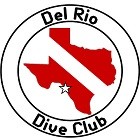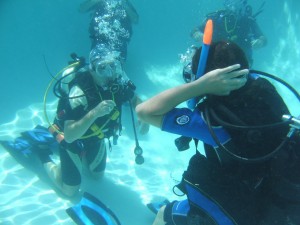Although not official a part of the Del Rio Dive Club, scuba diving certification is available locally. Robert Wade is a certified instructor with PADI (Professional Association of Diving Instructors), #234370, and has been teaching classes including Basic Open Water, Advanced Open Water, Rescue Diver and Divemaster since 2008. An avid diver since 1985, Robert (aka ScubaDog) has consistently maintained the high standards of the PADI curriculum while keeping the classes fun and interesting. His primary motivation for teaching scuba diving has always been to share wonder and excitement of the sport with anyone willing to try. Classes are structured to give students plenty of self-study time and then maximizing value with the in-class and in-water portions.
A regular course schedule has not yet been planned for 2023 due to the sustained horrible visibility at Lake Amistad and challenges lining up a local pool to work with. As we resolve the pool issue, we’ll update this page. Recreational diving is supposed to be fun and relaxing, and most students have significant anxiety mastering skills in open water when conditions are this adverse. As a result, we must limit class sizes to two and students must already be very comfortable in open water.
If you have considered the challenges, conditions and risks and are still interested feel free to contact us to work out a schedule. While PADI’s eLearning option for the academics portion is now the primary method to get started, you can also choose to accomplish the academics via DVD & workbook followed by evening classroom review & tests. Once the academic portion is complete you will accomplish the practical application in a pool and open water.
Basic Open Water classes are $325 per person or $425 for private instruction. This price includes the eLearning academics or student Open Water Pak (workbook, dive tables (aka Recreational Dive Planner) logbook, instructional DVD, the formal instruction) and use of a BC (buoyancy compensator), pressure gauge & dive computer console, tanks and weights. Students must supply their own personal gear: wetsuit, boots, mask, fins, snorkel and submersible watch. Students must also be able to swim 200 meters (any style or styles, not in a wetsuit) or 300 meters with mask and fins and tread water for 10 minutes. After successfully completing all required course objectives students will be given a signed temporary certification card with their permanent card to arrive typically 2-3 weeks later. Newly-certified divers are encouraged to dive as often as possible after getting certified in order to build more confidence in the fresh dive skills. NOTE: If you have completed the PADI eLearning portion with another instructor or dive shop please bring your documentation to complete the in-water portion of the course, the cost is $240.
Prior to considering taking the course you should download the following documents: “Things To Know” and Medical Questionnaire. The first document provides more depth and detail to the requirements of the course, format of the instruction and my personal notes. The second document is a Medical Statement that you’ll need to fill out. In some cases you may find that a physician is needed to evaluate your specific condition and make a determination if it is safe for you to dive. As always, if you have any questions feel free to contact me.
It is highly recommended that you contact us for a Discover Scuba opportunity if you are not sure that diving would be right for you. These are typically free of charge and allow you to get basic familiarization with scuba while in a pool. This will help you avoid wasting money and time on certification in the event you find you’re unable to finish the course. Finding out whether or not you would even be comfortable breathing underwater is an important aspect of diving.
For April/May classes: Amistad Lake is huge. It takes many weeks of very hot weather to warm the lake up. Be prepared to acquire a 5 or 7mm full wetsuit with hood, gloves and boots if you will be taking classes early in the season, where water temps will still likely be only in the 70s near the surface and 50s or 60s at depth.

